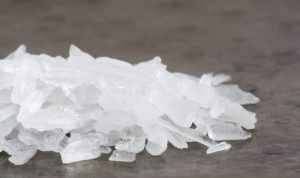Crystal Meth: Health Effects, Withdrawal, & Addiction Treatment
What Is Crystal Meth?
 Crystal meth is an illicit form of methamphetamine commonly encountered as glass-like fragments or shiny, whitish crystalline rocks. Meth is a powerful central nervous system stimulant, and its use may lead to serious medical complications.1
Crystal meth is an illicit form of methamphetamine commonly encountered as glass-like fragments or shiny, whitish crystalline rocks. Meth is a powerful central nervous system stimulant, and its use may lead to serious medical complications.1
It can be used via several methods or routes of administration, including:1
- Injection.
- Smoking.
- Nasal inhalation (snorting).
- Oral routes (swallowing).
Why Is Meth So Addictive?
Meth is a potent stimulant that increases the activity of several neurotransmitters. When used, the resulting norepinephrine, serotonin, and dopamine release is associated with a surge in energy and sense of euphoria, as well as feelings of reward, motivation, and pleasure.2
These effects serve as a powerful reinforcement for continued meth use, which makes the drug highly addictive.1
Also, the initial rush of a methamphetamine high fades relatively quickly, often disappearing before the drug has even left the bloodstream. This can prompt a binge cycle of use known as a “run,” where people forego food and sleep for days at a time and use the drug again and again as each high wears off.3
What Are the Long-Term Effects of Meth?
Repeated use of crystal meth can greatly increase the risk of addiction. It can also lead to dramatic—and sometimes long-lasting—changes in brain structure and function. These changes and other adverse health effects may include:1, 4, 5
- Anxiety.
- Chronic sleep problems.
- Extreme weight loss.
- Changes in mood and violent or aggressive behavior.
- Confusion and forgetfulness.
- Paranoia and hallucinations.
- Irregular heartbeat, palpitations, and cardiac arrest.
- Elevated stroke risk and associated brain injury.
- Potential brain cell damage as a result of increased microglial activity.
- Skin sores from intense scratching.
- Gum disease, tooth decay, and loss of teeth (“meth mouth”).
While many of these health effects will improve with abstinence and/or medical treatment, others can be slower to resolve or, in the case of outcomes such as stroke-related brain injury, irreversible.5, 6 Chronic injection of meth may also increase the risk of contracting certain bloodborne illnesses, such as HIV, hepatitis B and C.1 There is also some research evidence to suggest an association between past methamphetamine use and Parkinson’s disease.1
Dangers & Risks of Crystal Meth Use
One of the greatest risks of crystal meth use is overdose.
Since 1999, stimulant-related overdose deaths, such as those involving meth, have drastically risen—increasing 29-fold by 2019.11 In 2017, 15% of all drug overdose deaths in the U.S. involved methamphetamines.1
Because the high from meth tends to be short-lived, many people engage in what’s called a “binge and crash” cycle.3 Repeatedly chasing a high with increasingly large amounts of meth can also increase the risk of toxicity and overdose.1
An acute meth overdose may occur when an individual uses a dangerously high amount of the drug, resulting in significant toxicity and, often, life-threatening reactions to the drug.1
Additionally, the risk of overdose increases when people knowingly or accidentally mix stimulants with fentanyl.4
Signs and Symptoms of Meth Overdose
A meth overdose can be lethal and requires immediate medical attention. Individuals need to be monitored for cardiac and respiratory failure, as well as major organ damage.1 In the event of an overdose emergency, or suspected overdose, call 911 immediately for help.
Potential signs and symptoms of a meth overdose or toxicity include:1, 7, 8, 9
- Dangerously high blood pressure.
- Stroke and resulting neurological deficits.
- Acute chest pain.
- Heart attack.
- Heart arrhythmia.
- Hyperthermia.
- Rhabdomyolysis (muscle fiber breakdown).
- Acute psychosis (marked paranoia, delusions, hallucinations).
- Severe psychomotor agitation or other unusual muscle movements.
- Seizures.
- Marked breathing irregularities.
- Loss of consciousness/coma.
Signs of Methamphetamine Addiction
Doctors and other healthcare professionals diagnose meth addiction as what’s known as a stimulant use disorder. Several diagnostic criteria are used to make these diagnoses. If you are worried that you or someone you love may be compulsively using methamphetamine, here are some characteristic signs, symptoms, and behavioral changes associated with methamphetamine use disorder:8
- Meth is used in larger quantities or for longer periods of time than intended
- Persistent desire or craving for the drug
- Inability to control or reduce use
- Failure to function in daily obligations like work or school because of meth use
- Loss of interest in family, friends, or social activities
- A great deal of time is spent obtaining, using, and recovering from methamphetamine
- Continued use, despite experiencing negative consequences associated with use
- Continued use, despite drug’s negative effects on existing health issues
- Use in physically dangerous situations such as driving a car
- Increased tolerance to the drug
- Withdrawal symptoms from reduced use or the need to continue using meth to avoid withdrawal
Should a person exhibit two or more of the above signs or symptoms within a 12-month period, they may meet the criteria for a stimulant use disorder and might benefit from professional medical attention.
Also, as mentioned in the previous section, meth use can severely affect the mind and body. Some psychological effects, such as anhedonia—which is characterized by diminished interest in or ability to enjoy otherwise pleasurable activities—can sometimes linger or last long after a person stops use.10
What to Do If You Suspect Someone Is Addicted to Meth
If you think you or someone you love is addicted to meth, the first step is to get help. There are different ways to approach this. You can:
- Look for quality, evidence-based treatment centers near you that accept your insurance.
- Research state-funded programs if you don’t have health insurance.
- Talk to your primary care doctor about your struggles with addiction. They can help point you in the right direction and assist with next steps.
It’s important to note that while your situation may feel hopeless and overwhelming, you are not alone—and addiction is treatable.12 Seeking treatment is a brave and crucial step toward long-term recovery.
At Oxford Treatment Center in Etta, Mississippi, we are here to help you along the way. Call us anytime at to learn more.
How to Treat Methamphetamine Addiction
 Because addiction is so complex and touches virtually every part of a person’s life, there is no one-size-fits-all approach to treatment for stimulant or other substance use disorders.12 Most top-tier, evidence-based programs offer different levels of care that range in intensity and can be tailored to meet the individual’s specific needs.
Because addiction is so complex and touches virtually every part of a person’s life, there is no one-size-fits-all approach to treatment for stimulant or other substance use disorders.12 Most top-tier, evidence-based programs offer different levels of care that range in intensity and can be tailored to meet the individual’s specific needs.
In general, effective treatment for meth addiction should:12
- Employ a holistic methodology, attending to a person’s total physical and mental health.
- Address any co-occurring mental illnesses, which are common in people with substance use disorders.11
- Involve various types of therapy, such as individual and group counseling and cognitive behavioral therapy (CBT).
- Monitor the risk of relapse.
- Be subject to change, as the person evolves and progresses toward recovery.
At Oxford Treatment Center, the various levels of care include:
- Medical detox. Also called withdrawal management, this is often the first step in the recovery process.
- Residential. Patients stay and live on campus, where they receive 4–6 hours of counseling a day and full-time access to medical care.
- Partial Hospitalization Program (PHP). Also called day treatment, this program allows people to return home at night, after participating in intensive treatment and counseling during the day.
- Intensive Outpatient Program (IOP). Less intensive than PHP, people in this program receive treatment for 3–4 hours a day, while still maintaining work and familial obligations.
- Standard Outpatient. Less intensive than IOP, this program offers therapy and counseling based on the person’s need.
In addition, different facilities offer specialized programs and therapies based on population and environment. For example, patients at Oxford have access to art and equine therapies and customized programs for veterans and first responders. Telehealth services are also available.
Detoxing From Meth
Detoxification is the process by which the body rids itself of a drug or its metabolites.14 For stimulant drugs such as methamphetamine, this process is rarely life-threatening, but can be extremely uncomfortable.
Stimulant withdrawal syndromes, such as those associated with methamphetamine detox, often require less aggressive withdrawal management efforts as those associated with other substances like heroin and alcohol, because the symptoms are generally less intense and rarely present any immediate medical danger.15 There are currently no medications specifically approved by the FDA for the treatment of stimulant withdrawal, but support and symptomatic management may still be helpful during this often unpleasant period.15
The length of detox varies from person to person, depending on the type of drug used and extent of intoxication. Acute withdrawal from meth usually begins within 24 hours of the last use and can linger for several days or weeks.11
When detoxing from meth, withdrawal symptoms may include:11, 15
- Anxiety.
- Agitation.
- Depression.
- Fatigue.
- Headaches.
- Insomnia.
- Increased appetite.
- Lack of concentration.
- Mood swings.
- Psychosis.
People withdrawing from methamphetamines may experience the resulting depression and extreme moodiness for months, as compared to detox from other stimulants like cocaine.11
The discomfort of withdrawal can sometimes trigger suicidal thoughts and/or intense cravings for the drug, which may increase the risk of relapse.11 This is of particular concern with people withdrawing from methamphetamines.13
Most experts recommend medically assisted detox, or withdrawal management, so people can take this step in a clinical environment under medical supervision, helping to ensure safety and enhance the chance of success.
While considered an essential part of the process, detox alone is not enough to support a person’s long-term recovery from meth addiction.12,14 Recovery truly begins with admission into a quality, evidence-based rehab program, where a person’s overall mental and physical health—and the deep-seeded issues underlying the addiction—can be addressed.
Getting Admitted to Rehab
If you or someone you love is ready enter rehab for meth addiction, contact us 24/7 at and one of trained admissions navigators can provide more information about your treatment options and the admissions process. Upon arrival at Oxford or one of other facilities, an addiction treatment specialist will evaluate your mental and physical health and determine the most effective route of care.
For many people, figuring out how to pay for rehab and understanding their insurance coverage can be frustrating and tricky. But don’t let that stand in the way of seeking the help you need.
Most places offer financing or other payment options, and will work with you and your insurance company to obtain the necessary preauthorization and other requirements that ensure your care is approved.16
To get started, fill out the quick and confidential form below. You will receive an email back from us right away verifying your insurance coverage and detailing important next steps.
Meth addiction can have extremely severe consequences—but it is treatable and there is hope.12 Call us at or complete the form below to begin the path to recovery today.